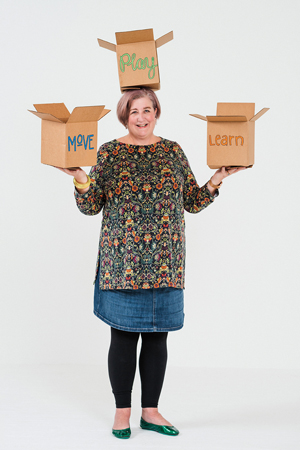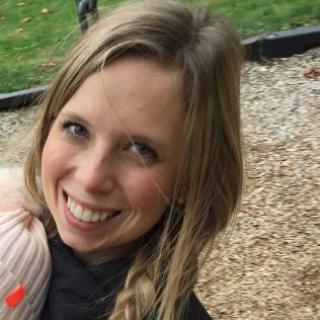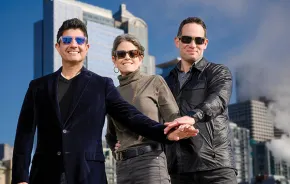
As far back as Putter Bert can remember, children’s museums have played a significant role in her life. As a young child, she struggled with a stutter and had to go to speech therapy once a week. As an incentive, her mother would reward her with a trip to the Boston Children’s Museum after her therapy sessions. She fell in love with the magic of the museum, especially the “Giant’s Desktop” exhibit, complete with a giant-scale rotary-dial phone, desk blotter, pencil and coffee cup. This same museum was where she eventually started her lifelong career.
From Boston to Arkansas to her current role as president and CEO of KidsQuest Children’s Museum in Bellevue, Bert has worked at children’s museums across the country. “She has dedicated her career to childhood education and serving the community through the power and ‘magic’ of children’s museums,” writes Heather Trescases of colleague Bert.
Bert’s emphasis on creative play and exploration has influenced the newest incarnation of the KidsQuest facility, where children and families are encouraged to challenge themselves, learn and grow together. This emphasis is immediately apparent upon walking into the museum and being greeted by a 28-foot climbing structure. “I think the whole point of the museum is not to master something the first time, but to experience it in different ways each visit, so you can take the tools and skills you have learned out into the community,” says Bert.
Bert feels strongly that the role of a children’s museum is to be a vital resource to families in the community. In her current role at KidsQuest and through partnerships with other community-minded organizations, such as the King County Library System, Hopelink and Friends of Youth, Bert has helped reach thousands of families in our area that otherwise might not have been served. Of the more than 200,000 people served by KidsQuest in 2019, 33,800 accessed the museum through free and reduced admissions, programming and scholarships.
“I think it’s really important to remember that we are here for the community, not for the museum. It’s not about us — it’s about the people we serve. If we can be nimble and pivot and, most importantly, listen, then we are going to be the resource this community needs.”
What one thing did an adult or mentor do for you as a youth that helped you succeed?
My education teacher in college, who was also my thesis advisor, was really influential in how I decided to go forward in education. The winter I wrote my thesis, she asked me to drive the kindergarten van. I said yes, not knowing what it was going to teach me. What I learned was that I was the first person to greet those children every morning. If they were in a bad mood or not feeling up to par, I had the power to change that between home and school.
What that has done for me in the children’s museum field is to realize the importance of the front desk. You never know what someone’s back story is or what they confronted that day. When they walk through our door, we have the ability to change their whole day with a smile, or a thank-you or with a welcome. The power of personal interaction is remarkable.
What do you wish people understood about your work?
Children’s museums are still misunderstood after 125 years. It is still assumed that we have art behind glass that is either done by children or for children, and that’s not the case. The role of the children’s museum is to be an integral community leader, to give tools to children and caregivers to make their journey in life more fun and more exciting. We aim to educate children and adults. We are an organization for the whole family.
What’s one small action readers can take in their own lives to make positive change happen?
Be kind. Lead with kindness; it can change the world. Sometimes people can get wrapped up in themselves or the politics of things and get overwhelmed. If you can take that coat off and be kind to someone, it really can change their day and, ultimately, yours.
What daily habit or small routine is most important to you?
Cooking is my therapy. Whether it is for my family or for 100 people, it is where I can really zone and be happy. It is how I let the day go.
What has been the most profound change in your work in the past 10 years?
We are not a school or a government agency, so we can take more risks. I think that is what has changed in the past 10 years: the amount of risk we can take. We don’t believe there is one way to do anything; we allow for different perspectives. Every time you come to the museum, there are different people here doing things differently than maybe you would have, and that’s one way to learn and grow.
Do you have any advice for today’s parents who want to raise and support their kids to achieve big ambitions?
Let go. Let them explore, let them skin their knees, let them try and fail. Failing is not a bad thing — that’s how we learn. You learn by trying again and looking at things differently. Kids are very resilient and really smart. They come out smart, so celebrate that!
Favorite read of the past year?
I read a lot of nonfiction written by professional chefs, such as Ruth Reichl. I never want to cook professionally, because I find too much joy in it that I don’t want it to be work, but I find reading about it very interesting.
If you could destroy one myth, what would it be?
That cooking is hard. Just try: You have a nose and a mouth — if it tastes bad, that’s okay! It is really intimidating to some people and it shouldn’t be. A dream I have is to teach cooking classes someday.
Any ideas for great ways to get kids involved in volunteering?
Find what they love and find a volunteering opportunity that involves that. Find what is meaningful to the child, not necessarily to the parent. We do a lot of putting on as parents and forget to ask the child what is meaningful to them.
Also, you will always make a difference in the community if you are sharing your skills and abilities; it doesn’t have to be about solving world peace right now.
What is your favorite exhibit at KidsQuest?
That’s like picking my favorite child! There are little things in many of the exhibits. The mousehole in the Mercantile, the museum on the train table, the labyrinth in Connections, the musical bench in Sticks and Stones, the quotes on the tree trunks on the Story Tree and the chicken on the window in the Tot Orchard. I hope everyone can go find those little treasures.











